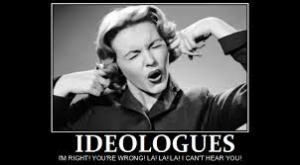The ultimate end of any ideology is totalitarianism. – Tom Robbins
At this point I need to revisit my use of the term “ideology”, especially because of my desire to avoid confusing the term with idealist, something I would encourage anyone to become. Ideology is one of those concepts open to various shades of meaning. At its most innocuous, it simply refers to any body or system of belief held as a guide to living by individuals, groups, peoples, parties, etc. Inasmuch as we are all governed, whether consciously or not, by certain assumptions about how the world and everything and everyone in it works, we can all be considered followers of some kind of ideology, even if most of us probably don’t spend much time trying to define the particulars of ours.
Ideology becomes of concern (and potentially terrifying) when it leads to the creation of ideologues, individuals who see the world exclusively through the lens of a particular, fixed point of view. The harmless ideologue might be the person who sees absolutely everything through a positive lens. While that can sound innocuous, the potential for detrimental consequences is possible even in that instance. Such an ideologue becomes, potentially, the person we might all know who refuses to look at reality and constructs elaborate facades and rationales in order to preserve a “positive outlook”.
Examples of more distressing examples are easy to find. I’ve referenced in an earlier blog my continuing interest in the Holocaust and, in particular, my quest to somehow understand how anyone could reach a place where the systematic murder of millions could be viewed not only as acceptable but even as a benefit. I still don’t understand it on a deep level; however, my investigations lead me to believe that the Hitlers and the Himmlers and their many imitators, for all that they might have recognized that the world at large might disagree with them, were “true believers”. Somehow, they were able to embrace an ideology defined by the belief that eradication of the world’s Jewish population was “good”. One account I’ve read of a visit by Himmler to a concentration camp where he watched the execution of inmates tells of how upset Himmler was and, further, how concerned he was for the well-being of the executioners who were tasked with “this unpleasant but necessary work”.
We are living in an era when radical Islamism is able to justify broadcasted beheadings, suicide bombings, targeted executions or any other method that they imagine advances the possibility of some kind of success. The ideology and the fulfillment of its ends trumps all other considerations.
Another example that has always been powerful for me: Josef Stalin. Stalin purportedly was directly responsible for some 20 million deaths over the course of his 30 odd years as absolute ruler of the former Soviet Union. Many have written at length of these “atrocities” but if you can imagine, for even a moment, that all that Stalin did was in service of the advancement of Soviet communism, do his crimes become necessary and good? Certainly a central tenet of Leninist communist ideology is that the individual is not as important as the furthering of the ultimate goal, the creation of the communist utopia. This falls into that same category as the Holocaust for me. Could anyone actually believe that mass murder on such a scale could be justified? The answer to me is far more straightforward than you might think: if people can strap explosives to children and detonate them in the midst of an unsuspecting crowd because they believe God wants them to do so, what CAN’T ideology find a way to justify?
I know I have been depending on extreme examples in this blog but I want to make clear how much the embracing of an ideology can trump what the rest of us might think of as “reality” or clear moral positions, positions that most of us take for granted. For example, surely no one can justify the deliberate sacrifice/murder of children to a cause? And yet, it happens with frightening regularity these days.
Ideologies, when they become the lens through which we view the world, can predetermine what we see. Of greatest concern for my purposes is what I have come to regard as the ideology of technological humanity – a belief, in simplest terms, that human beings are mechanisms subject to adjustment and to continuous improvement. While that doesn’t sound so bad, I want to argue it is at the root of any number of problems we encounter these days. As you might expect, considering my background, I became convinced of this, initially, through my experiences in education.

Hey Carl Looks like I found your blog. Your article speaks to what perhaps is the central issue of our time. One other element all of these movements have in common is their determination to prohibit any challenge to their (usually millenarian) world-view. Sadly we see this reality played out across what should be our bastions of free speech, our universities. The shutting down of speaker after speaker for espousing challenging opinions, has become too routine to report.
Wishing Your Enterprise Well
Ray M
LikeLike